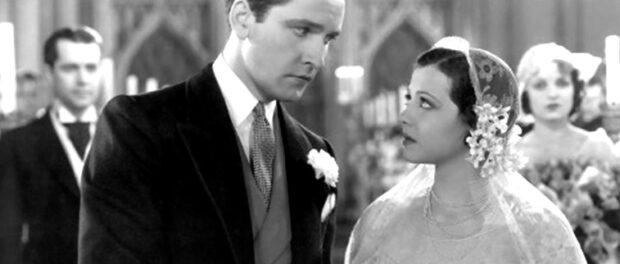Merrily We Go to Hell (1932)
[5]
Sylvia Sidney (Madame Butterfly, Sabotage) plays a rich girl smitten with a drunkard. Fredric March co-stars as her somewhat charming but sobriety-challenged lover, effectively doing a dry-run for the type of role for which he’d receive an Oscar nomination five years later with A Star is Born. Despite the warnings of her father (George Irving) and friends, Sidney marries March and things go as badly as predicted — beginning with March losing the wedding ring and surreptitiously improvising with a wine corkscrew he digs out of his tux pockets.
Sidney is very charming, completely selling the notion of young, infatuated love. March does the material justice, the production values are exceedingly high, and director Dorothy Arzner (Christopher Strong) is ahead of her time with shot layout and scenic design. The only thing I don’t like is the script.
It may just be my own idiosyncrasy, but I’m rarely a fan of heroes or heroines who invent their own strife and then force me to suffer through it. Sidney’s character has every warning given to her, both before and after she marries March. The high points are few and the low points are many. It’s like an elaborate episode of the ‘Saturday Night Live’ skit ‘Toonces the Driving Cat,’ in which every episode begins with passengers in a car worrying that their feline driver will crash and kill them all — and then he does.
The ending of Merrily We Go to Hell isn’t quite that predictable, though it does approach that level of darkness. But it’s also not terribly satisfying, either. It’s ultimately a well made film with no place interesting to go.
With Adrianne Allen, Skeets Gallagher, and Esther Howard. Look for Cary Grant in a small role.

